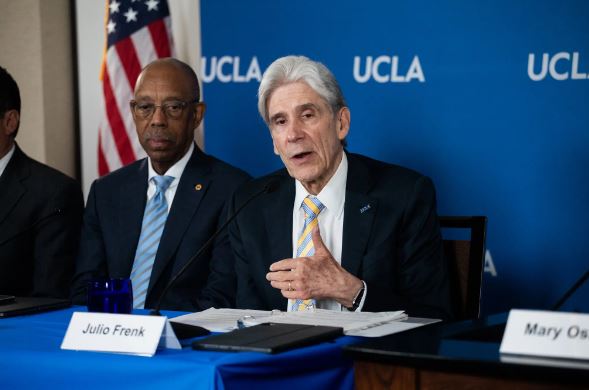Julio Frenk, a renowned public health expert and president of the University of Miami since 2015, has been appointed as the next permanent chancellor of the University of California, Los Angeles (UCLA). This announcement, made on Wednesday, marks a historic moment as Dr. Frenk will be the first Latino to lead UCLA. He succeeds Gene Block, who will step down at the end of July after 17 years.
Dr. Frenk’s appointment comes during a tumultuous time for UCLA, which has been grappling with intense protests and a violent incident involving student demonstrators earlier this spring. His experience and background are seen as vital to healing and uniting the campus community.
Born in Mexico City to German immigrant grandparents who fled during the 1930s, Dr. Frenk has a distinguished career in public health. He served as Mexico’s secretary of health from 2002 to 2006 and was the dean of Harvard’s School of Public Health before leading the University of Miami.
Throughout Dr. Block’s tenure, UCLA enhanced its academic reputation by attracting significant research funding and top-tier students. However, his administration faced criticism over its handling of pro-Palestinian demonstrations, which led to significant unrest and controversy on campus.
Dr. Frenk will officially assume his role in January. In the interim, Darnell Hunt, the executive vice chancellor and provost of UCLA, will serve as acting chancellor starting in August. During a news conference, Dr. Frenk expressed his intention to listen to all campus constituencies and projected a cautious, inclusive tone.
UCLA, known for its diverse student body and prestigious status in California’s higher education system, admitted only 9 percent of applicants for the freshman class last fall. The university’s athletic teams are also set to join the Big Ten Conference, promising increased revenue but necessitating more extensive travel for competitions.
Dr. Frenk’s tenure at the University of Miami was not without challenges. In 2021, he faced condemnation from the university’s faculty senate for firing the law school dean and criticism from Miami’s football team fans. Despite these controversies, he was not tested by protests akin to those at UCLA.
In April, UCLA witnessed a significant protest encampment advocating for Palestinian causes. This encampment stood for several days, contrasting with the University of Southern California, which quickly dispersed a similar protest. The UCLA encampment led to one of the nation’s largest counterprotests by Israel supporters, creating tensions and clashes on campus.
The situation escalated on April 30 when a group of instigators attacked the pro-Palestinian encampment with fireworks and physical assaults, while law enforcement initially did not intervene. The following night, police dismantled both pro-Palestinian and pro-Israel encampments, resulting in over 200 arrests. Dr. Block later faced scrutiny for his handling of the situation, narrowly avoiding a formal rebuke from the faculty’s governing body.
Dr. Block’s testimony before a congressional committee highlighted the challenges universities face in addressing antisemitism and balancing campus safety with free speech. UCLA, like many other institutions, is dealing with budget constraints, political polarization, and campus unrest.
Since early May, security measures at UCLA have intensified. More than 20 pro-Palestinian protesters were arrested on campus on Monday night. On Wednesday, as the University of California regents voted to appoint Dr. Frenk at the Luskin Center, the building was heavily secured with chain-link fences, security guards, and police officers. Outside, members of the University of California system’s largest employee union protested in support of pro-Palestinian demonstrators, emphasizing the ongoing tensions.
Dr. Frenk’s leadership at UCLA will be critical in navigating these challenges and fostering a more inclusive and peaceful campus environment.

